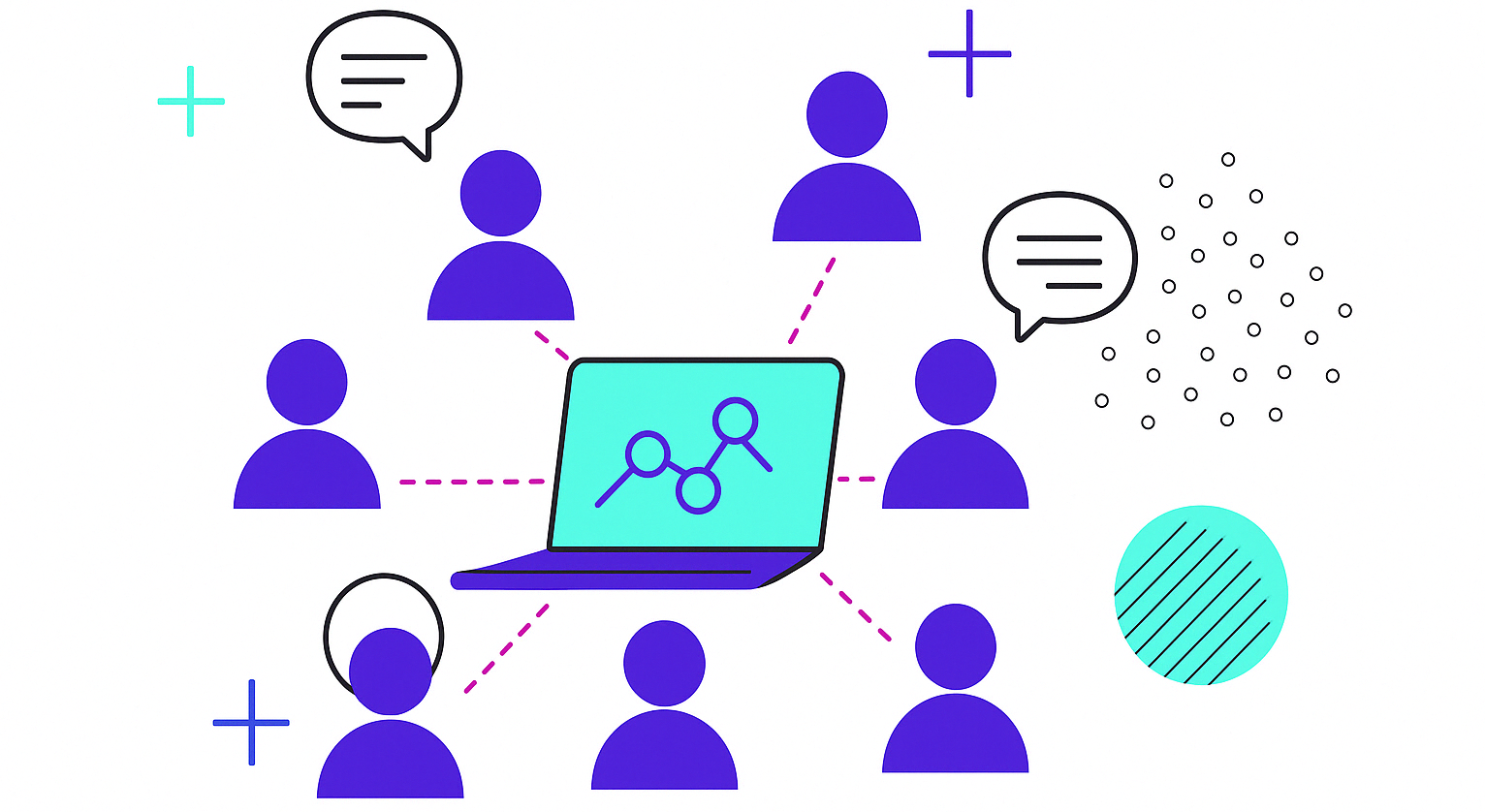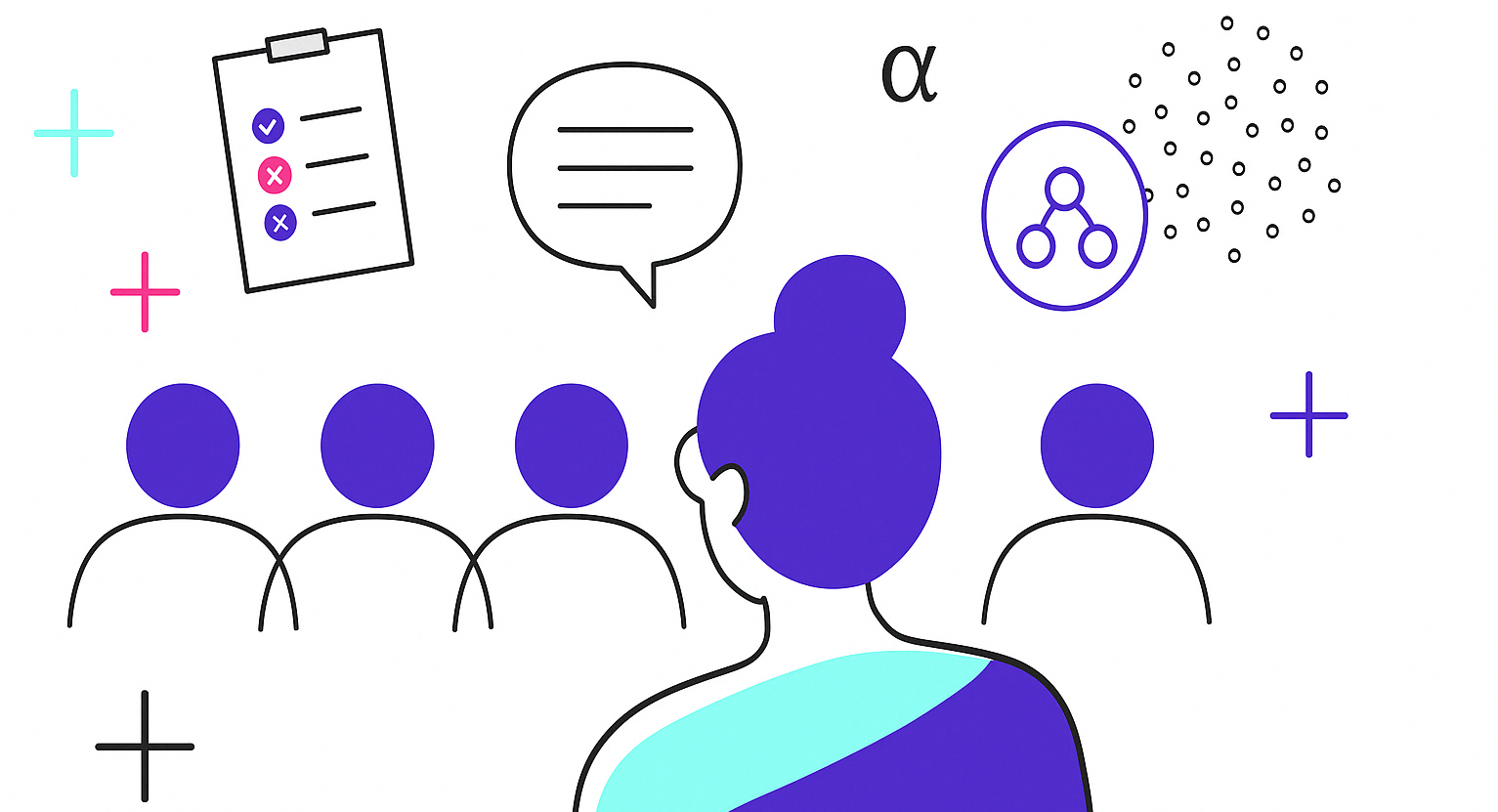How We Recruit Experts for a Delphi Study: Our Six-Step Email Playbook
April 14, 2025, 8 a.m.

by Manuela Verde and Jeffrey Franc
In the vast landscape of survey methodologies, Delphi studies hold a unique position due to their iterative nature and reliance on expert consensus. Recruiting participants for these surveys, however, is no small feat. The challenge lies in identifying and engaging individuals with the precise expertise needed to generate meaningful insights. Furthermore, as Delphi studies are iterative and time consuming, keeping the experts engaged throughout the process requires special attention.
As professionals who have orchestrated numerous Delphi studies, we have navigated these complexities firsthand, having recruited hundreds of experts. Despite our experience, we still find the process challenging, which is why we've refined a unique method over time.
Interestingly, we have also been on the other side, experiencing the selection process as experts ourselves. This dual perspective has not only deepened our appreciation for the intricacies involved but has also fueled our commitment to refining the process.
Drawing from our experiences as both designers and participants, we have developed a streamlined six-step approach to expert recruitment. This methodology, grounded in six distinct principles, has consistently delivered excellent results.
Step 1: Personalized Recruitment Email
The cornerstone of effective recruitment is a personalized email from someone who has a direct relationship with the expert. Academics receive countless anonymous survey invitations, making it easy for them to overlook generic requests. A personalized message cuts through the noise.
This approach ensures the recipient feels valued and is more likely to engage.
In cases where we do not have direct access to the experts, we often enlist the help of local champions to serve as liaisons. For instance, for our recent international Delphi study, we recruited one co-author for each world region. Co-authors served as a vital local link for the international recruitment process. Experts received the initial recruitment email from a local champion who was known to them rather than an anonymous “Dear researcher” email, which is frequently ignored.
For example:
Linh,
I hope this email finds you well! It was nice to see you at the recent conference in Glasgow.
I am collaborating with some colleagues at Northbridge University on a study entitled “Establishing Consensus on Core Competencies for Telemedicine Practice.” Given your experience as an emergency physician, we would like to invite you to our study as an expert participant.
This study will consist of several short surveys (3 or 4), each taking approximately 20 minutes to complete. We expect the total time commitment to be around 90 - 120 minutes over about 3 months. You would be given an acknowledgement in the final published paper (if you would like).
If you are interested, please let me know and I will forward your name to the study coordinator.
Thanks for considering,
Yusef
We recommend that these emails are sent from the personal email account, not from an automated email service. Furthermore, we consider the personalized recruitment email as another example of “clarity beats cleverness.” The email articulates clearly the responsibilities (approximately 120 minutes of their time) and the limitations of the benefits (experts are acknowledged but are not co-authors).
If experts respond affirmatively to the email, the original sender will usually reply with something simple like:
The email is sent in .cc to the study coordinator, who can send the next email at step 2.
Step 2: Enrollment Email
Once the expert has expressed interest, the next step is the enrollment email. This email is usually sent by the study coordinator or primary investigator. It provides comprehensive information about the study. It should include formal consent documents from the relevant ethical body and invite the expert to ask any questions. It should also mention that they will soon receive an email from the automated survey platform, such as Stat59, with further instructions on how to proceed.
Experts are also invited to seek additional clarification about the study by replying to the email.
I hope this email finds you well!
Thank you for agreeing to participant in our study entitled “Defining Essential Digital Literacy Skills for 21st-Century Educators”. Given your experience as a health educator, we are happy to have you join our list of experts.
The study information sheet and consent form are attached to this email for further reference. This study will consist of several short surveys (3 or 4), each taking approximately 20 minutes to complete. We expect the total time commitment to be around 90 - 120 minutes.
You would be given an acknowledgement in the final published paper (if you would like).
Please watch for an automated email from info@stat59.com with instruction on how to complete the first survey.
You can respond to me directly with any questions or concerns.
Sincerely,
Ravi Okeye,
Study Coordinator
Generally, we have had very good luck with ethics boards of most universities not requiring a signed consent document. Most will consider registering for the study online as implied consent. If your ethics granting body requires a signed consent, it should be indicated in this email, and signed consents collected by the study coordinator or primary investigator.

Step 3: Study Registration Email
The next email, typically from the automated platform like Stat59, will guide the experts on how to register for the first survey round. This email includes step-by-step instructions for creating a username and account, ensuring a seamless entry into the study. It's crucial that experts are anticipating this email, as automated messages often get overlooked by busy professionals. Setting this expectation in prior communications helps ensure they follow through.
For example, automated study registration emails from STAT59 look like this:
This is an automated email from Stat59
Dear Elias Mercer:
You have been invited by Hana Takeda to participate in the project “Expert Consensus on High-Value Indicators for Emergency Department Overcrowding” in the role of Delphi Expert. If you agree to participate in the project, please click here:
https://www.stat59.com/xxxxx
This is a personalized link for you only, please do not share it with others. For security purposes this link will expire on June 10, 2025, 9:35 p.m. UTC. If your link has expired, please contact your project coordinator Hana Takeda or reply to this email.
As you have been invited as a Delphi Expert, you may want to view our YouTube video at https://youtu.be/nheZv8S1hTM for additional information on how to complete a Delphi project.
If you need help, please contact your project coordinator Hana Takeda or reply to this email.
Sincerely,
The Stat59 Team
FREQUENTLY ASKED QUESTIONS
Q. Why do I need to create a username?
A: In order to comply with best practice data protection for access to any Stat59 project requires creation of a username.
Following the personalized link in the email leads the expert directly to the first survey round. With STAT59 experts are invited to create their own unique username and password. In addition, they are given information about the privacy and security policies of STAT59. At the discretion of the primary investigator, the initial survey can also include consent to acknowledge the expert in the final paper or on social media.
Importantly, we do not send this automated email until the first survey round is ready for experts to complete. Experts may find it frustrating to go to the site, sign on, and find that the survey is not ready for them to complete.
Step 4: Next Round Reminder
Following the completion of each round of the Delphi study, experts receive a repeat invitation from the same platform, inviting them to participate in the next round. This ensures a smooth, continuous flow throughout the study. This email should contain explicit instruction on how to access the next round.
For instance, automated emails from STAT59 give the link to follow and instructions to use the previously created username and password.
This is an automated email from Stat59
Dear Jasper Wynn,
Thank you for your ongoing support in acting as an Expert for the study “Identifying Key Indicators of Urban Climate Resilience.” The study has now advanced to the next round.
The next survey round, “Climate Resilience Round 2” is now open.
Please go to https://www.stat59.com and login with the same username and password you used on the previous rounds. You will see the new questionnaire ready for your response under the DELPHI EXPERT tab on the MY PROJECTS page.
The questionnaire is scheduled to close on Sept. 24, 2025, 11:59 p.m. UTC, so please ensure your responses are complete prior to this time.
If you have any problems or concerns, please contact the study administrator Jasper Wynn at jwynn@xxxx.xxx or contact the Stat59 team by replying to this email.
Sincerely,
The Stat59 Team
FREQUENTLY ASKED QUESTIONS
Q. Why am I receiving this email?
A: You are receiving this email as you are listed as an Expert in this Delphi study. If you believe you have received this email in error, please reply to this email and we will remove your name from this list of Experts.
A similar automated email is sent each time a new survey round opens.
Step 5: Reminder Emails
Busy experts often get sidetracked by their other commitments, leading to delays in survey completion. When this happens, we like to send a personalized reminder email from the same contact who initiated the recruitment in Step 1. This message includes personal anecdotes and highlights the critical importance of their input, gently urging them to complete the survey as soon as possible. This approach helps re-engage experts while respecting their busy schedules.
For example:
Dear Nico Calderon,
Thank you for your continued participation in the Building Consensus on Priorities for Community-Based Mental Health Interventions Delphi study.
The third round, which opened at the end of November, was announced in an email from info@stat59.com. If you missed or overlooked it, this is a gentle reminder that your expertise is crucial at this stage to help refine and finalize the gathered statements.
Your responses in this round will play a significant role in shaping the insights and recommendations for the use of AI in disaster medicine.
To complete this round, please: Log in to https://www.stat59.com with your existing username and password. Navigate to the MY PROJECTS section and click on the DELPHI EXPERT tab. Assess the 47 refined statements provided and submit your evaluations.
Deadline: Please ensure you complete this round by the end of January, so the study can progress as scheduled.
If you're experiencing any issues accessing the platform or completing the survey:
A helpful how-to video is available here: https://www.stat59.com/about/help-video/delphi-expert.
You can also directly reply to this email if further assistance is needed.
Your input and dedication are deeply appreciated as we aim to consolidate expert opinions from across the globe. Together, we are contributing to groundbreaking advancements in Building Consensus on Priorities for Community-Based Mental Health Interventions.
We look forward to your participation in this critical phase of the study.
Kind regards,
Sofia Dlamini
Step 6: Thank You
Experts who have completed all rounds of the Delphi study will have devoted considerable time and effort and deserve meaningful acknowledgment. While Delphi experts may not qualify for authorship on academic papers, we make a point to acknowledge them if they agree, either in the paper or on social media. For those who prefer to remain anonymous, a heartfelt thank you email expressing sincere gratitude for their contributions is highly appreciated.
For example:
Dear Min-Jun Chen,
Thank you for your continued participation in the Defining Sustainable Agricultural Practices in Low-Resource Settings study.
Your responses for Round 3 have been correctly recorded, and I am pleased to let you know that a few key statements have already reached consensus. Therefore, we are hoping to wrap up the study by the end of next week – we are just waiting for a few more responses to finalize the results.
We have been offered an incredible opportunity to publish this study in a special edition of the Journal of Sustainable AgroSystems and Innovation, which would make it open access and freely downloadable. As you have requested, your name will be listed in the acknowledgements. Additionally, we will be presenting the preliminary results at the World Congress on Sustainable Agritech and Resilient Food Systems (WCSARFS) in May 2025. So, you can imagine how deeply we appreciate your contribution!
Cheers,
Talia Voss

Wrapping It Up: The Six-Step Expert Recruitment Playbook
| Index | Name of Email | Sender | Content |
|---|---|---|---|
| 1 | Personalized Recruitment | Known contact or local champion | Personal connection, invitation to join the study, sets tone for engagement |
| 2 | Enrollment Email | Study coordinator or PI | Study details, consent forms, next steps, encourages questions |
| 3 | Study Registration Email | Automated survey platform | Instructions to register and access the survey platform |
| 4 | Next Round Reminder | Automated survey platform | Invitation to participate in the next round of the Delphi survey |
| 5 | Reminder Emails | Original recruiter | Personalized follow-up, emphasizes importance of input, encourages completion |
| 6 | Thank You | Study team | Gratitude for participation, offers public or private acknowledgment |
In this blog post, Manuela Verde shares our proven six-step email strategy for successfully recruiting and retaining experts in a Delphi study. The process begins with a personalized recruitment email from a known contact or local champion to establish trust and interest. Once experts agree to participate, they receive an enrollment email from the study coordinator or principal investigator, providing detailed study information and consent documents. Next, a study registration email from an automated platform like Stat59 guides them through account setup. As the Delphi study progresses, experts receive next round reminder emails from the platform to ensure continued engagement. When participation lags, personalized reminder emails from the original recruiter help re-engage busy professionals. Finally, the process concludes with a sincere thank you email, offering either private or public acknowledgment for their valuable contributions.
Are You Ready to Increase Your Research Quality and Impact Factor?
Sign up for our mailing list and you will get monthly email updates and special offers.
